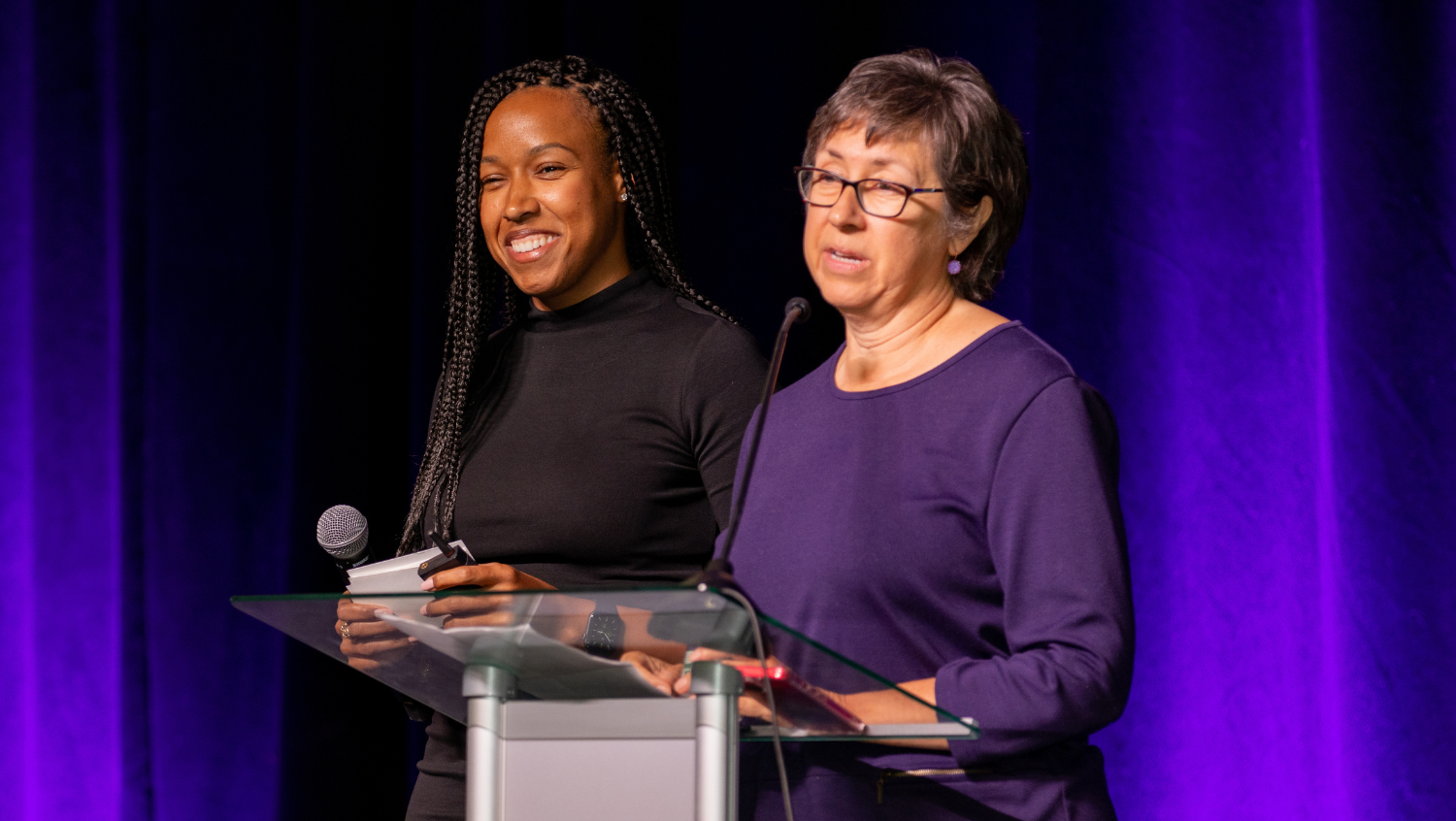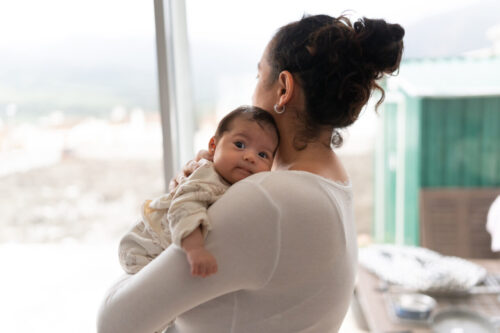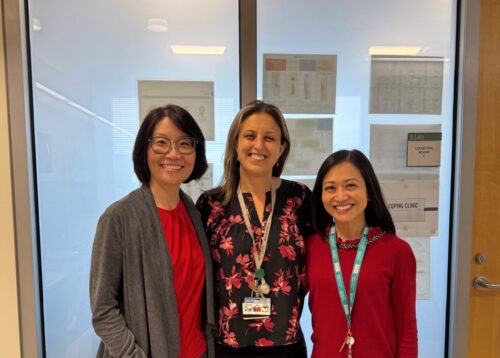BMC's Inaugural Addiction Conference Will Convene Experts and People With Lived Experience to Spark Change
January 25, 2024
By Katie Dillon

Boston Medical Center
(L to R): Daneiris Heredia-Perez and Miriam Komaromy presenting at EQTY 2023: A Summit for Health Justice (Boston Medical Center).
Together for Hope, hosted by the Grayken Center for Addiction, will dive into themes of intersectionality, policy, harm reduction, and advances and challenges in treatment.
The Grayken Center for Addiction at Boston Medical Center will host its inaugural two-day conference, Together for Hope: Boston Addiction Conference 2024, on March 15 and 16 at Roxbury Community College in Boston. The conference will bring together researchers, clinicians, students, community members, and those with lived experience of drug use and substance use disorder as well as their families. Its aim is to collaborate, share innovations, and re-establish connections and community that was disrupted by the COVID-19 pandemic.
Together for Hope stands unique in conferences related to SUD because not only did Grayken allow abstract submissions from a wide range of researchers and clinicians, but they also widened the abstract submission pool to people who don’t usually get to submit conference abstracts — such as harm reduction specialists and recovery coaches. Prior to the submission deadline for abstracts, the Grayken Center for Addiction Training and Technical Assistance (TTA) provided training for anyone who was new to the conference abstract submission process. They also extended invitations to community members — people living with SUD, people who use drugs, and their families.
The conference’s two-day series is split into four themes: advances and challenges in addiction treatment, intersectionality and addiction, addiction advocacy, and the role of harm reduction. Each day’s morning and afternoon sessions reflect plenary panels and breakout sessions revolving around those four core themes.
To learn more about Together for Hope, HealthCity spoke with Grayken’s medical director Miriam Komaromy, MD, senior research project manager Daneiris Heredia Perez, research project manager Kristopher Warren, and senior administrative coordinator Raquel Silvera, all of whom are planning and organizing Together for Hope.
HealthCity: One unique thing about Together for Hope: Boston Addiction Conference is that it’s inviting people with lived experience and calling for abstracts from fields such as harm reduction specialists and recovery coaches. Can you talk about that a little bit more?
Daneiris Heredia-Perez, M.S.P.M: We have such a wide range of people that will attend this conference: students, researchers, professors, providers, stakeholders, and people with lived experience. We wanted to make sure every single person — no matter their background — can participate in all segments of this conference. Some people may have never been to a conference before and that’s okay! We want to make sure that everyone feels welcome and included. How do you ensure everyone has the same background and can participate in these different conversations? The way you do that is to offer training on how to submit conference abstracts and what people can expect from a conference if they’ve never been before. We created different segments that apply to people with different backgrounds and different curiosities. For someone who’s feeling intimidated and not confident in their own expertise, that’s a way to get them to that place where they’re like, “Oh, I know what they mean by this. I can ask questions at this plenary now.”
Miriam Komaromy, MD: In my own research, I’ve seen that it’s so easy for us to look at our own clinical experience and read published papers and think that we know what matters to people with lived experience. But the truth is we don’t know unless we ask them. We can pour enormous amounts of time, money, and whole careers into designing interventions that don’t work because the people who matter don’t want them.
People who use drugs are so incredibly stigmatized and marginalized and are often not invited to be a part of the solution. We realized that unless we made an intentional effort to bring everybody into the room together, we would be missing that very valuable perspective. So we’re hoping that by making an explicit invitation and an effort to include people with lived experience, that we really can create a welcoming environment and a safe place for people to come to.
HC: What are you looking forward to seeing or experiencing at the conference?
Kristopher Warren: I’m just excited to help foster empathy and compassion for folks who use substances or who live with substance use disorder, because often those in academia may have the education, but they may not always have the empathy or understanding. I hope this conference will be a way to bridge that education and empathy. Having so many people from different walks of life and backgrounds under the same roof — and just giving everyone opportunity to meet, collaborate, share, educate — that’s something I’m really, really excited about.
DHP: I’m excited about the whole conference, but I’m most excited about some sessions on the first day. In the first half of the day, there’s a session called “Pathways from recovery to professional success in addiction treatment,” and I think it’s important for everyone to see that someone’s addiction is not their identity. There’s a future. You can have a career; you can have all kinds of things.
The other session that I’m really looking forward to is on in the afternoon of the first day called “How can we make addiction treatment more appealing, effective, and equitable for Black patients?” We’ve done a lot of research to understand what ideal addiction treatment looks like for Black people. And often you hear Black people say, “Well, [treatment] doesn’t feel welcoming — there are no magazines with people that look like me and I can’t relate to the music. The environment overall just doesn’t feel like it caters to my background.” I’m curious to hear what the panelists have to say and to see what the audience asks the panelists. I think it’s going to be a really good conversation.
MK: We’ve got a great range of representation of academic organizations, community-based organizations, and people with lived experience as panelists and leading breakout sessions. I’m also very excited to hear Kiame Mahaniah’s opening talk, “Challenges and success implementing addiction treatment in community health centers.” He is somebody who has worked at the community health center level as well as top leadership of Department of Public Health, so he’s able to bridge that divide between what it’s like to work in the community and as a top decision-maker in the Commonwealth.
Moreover, we’re very excited and honored to be holding it at Roxbury Community College, which is a longstanding pillar of the community in Roxbury. We wanted to hold it in an institution that’s really embedded in the community. And we’re particularly excited to be holding the conference at a predominantly Black institution. We also wanted to make sure the location was accessible by public transportation, and we’re hoping that a lot of people will take advantage of that and use the T and buses to get there to help us reduce the carbon footprint of the conference.
HC: What do you hope attendees take away from Together for Hope?
Raquel Silvera: I hope the conversations had at this conference start to open the door to de-stigmatizing substance use disorder, learn from each other, and leave with a new perspective, which might create more compassion and more understanding for people who use drugs.
MK: I’m excited about everything! The agenda of the two days is like a goodie bag of the most interesting and exciting speakers and topics. We’re so lucky that pretty much everybody who we set our sights on asking to participate so far has said yes with excitement. This conference is a progression for us. Our work in the past few years has predominantly focused inward within BMC, and this conference marks a shift to a broader audience. By offering this conference, we are convening the broader community of people focused on addiction in the Greater Boston Area.
“…it’s so easy for us to look at our own clinical experience and read published papers and think that we know what matters to people with lived experience. But the truth is we don’t know unless we ask them.”
DHP: One of my greatest hopes is that people will leave this conference inspired and energized by new innovations in substance use disorder treatment and ready to take accountability. I would love someone to walk away from this conference with the hope of adopting person-centered approaches to treatment and to see the value of lived experience — whether that’s making hiring changes or engaging in new research.
KW: We’re going to have workshops, breakout sessions, roundtable talks, panels, and an exhibit hall. So there’s so many opportunities for people to learn from a fellow colleague, for providers to learn from patients and vice versa. There are also so many opportunities for individuals to have hope that we’re progressing in the right direction when it comes to addressing substance use disorder in the Boston area.



